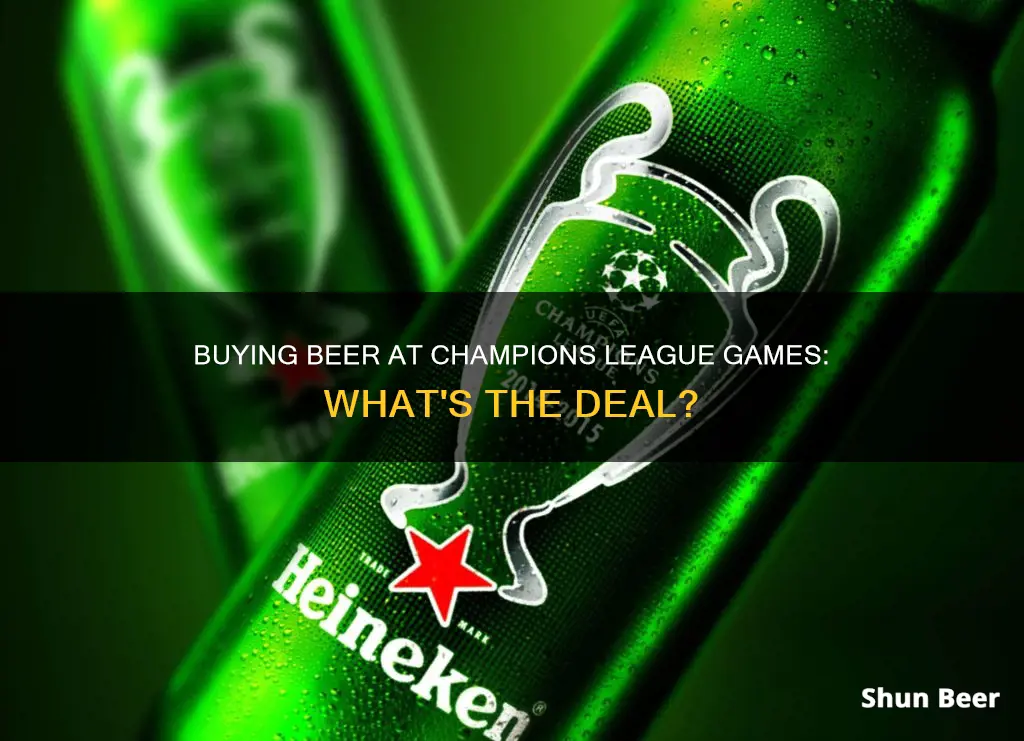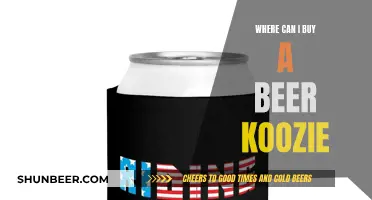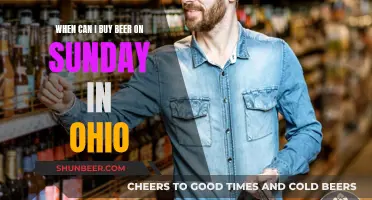
UEFA has lifted its ban on the sale of alcohol at Champions League and Europa League matches, allowing fans to buy beer and other alcoholic drinks at stadiums across Europe. This change comes after UEFA amended Article 36 of its Safety and Security Regulations, which now states that the sale and distribution of alcohol are subject to local and national laws. While this decision has been welcomed by football supporters, it has also sparked concerns about the potential impact on football-related disorder and hooliganism. In countries like the UK, where there is a law prohibiting the consumption of alcohol in view of the pitch, fans can purchase drinks at the stadium concourse but must consume them before taking their seats. This new regulation aims to strike a balance between fan experience and safety, but it remains to be seen how it will be implemented and enforced across different countries and venues.
What You'll Learn
- Alcohol was banned at Champions League games until 2018
- UEFA's decision to reverse the ban was welcomed by Football Supporters Europe
- Local laws will apply when it comes to alcohol sales within stadiums
- In the UK, fans can buy alcohol at Champions League games but must consume it outside the stands
- Alcohol branding has been removed from children's replica kits

Alcohol was banned at Champions League games until 2018
Alcohol was banned at Champions League games until 26 June 2018, when UEFA lifted the ban. The ban was in place at all Champions League and Europa League matches, forbidding the sale of any alcoholic drinks inside stadiums prior to and during the games.
The ban was lifted after UEFA's executive committee amended Article 36 of its Safety and Security Regulations. The amended article states:
> "The match organiser may only sell or distribute alcohol within the stadium or its private environs if and within the limits permitted under the national and local law as applicable from time to time."
This means that alcohol will be permitted at match venues where local and national laws allow it. For example, alcohol can be sold at stadiums in Germany, but not in England or France, where it is banned.
The ban was lifted following pressure from Football Supporters Europe (FSE), who argued that football supporters felt "unfairly treated" compared to fans of other sports like rugby. Ronan Evain, chief executive of FSE, stated:
> "It is not the sport you follow which makes you behave better or worse. Furthermore, the alcohol ban did not apply to VIP areas at football matches, causing a two-class society even within the stadia. Supporters felt that the alcohol banning policy was paternalistic, as there is absolutely no evidence or research to suggest that banning alcohol in a stadium has any bearing whatsoever on preventing or curtailing football-related disorder in and around it."
The previous alcohol ban in UEFA Champions League and Europa League matches had been in place since Euro 2000 due to concerns over violence and football-related disorder.
Blue Girl Beer: Can Americans Enjoy This Brew?
You may want to see also

UEFA's decision to reverse the ban was welcomed by Football Supporters Europe
UEFA's decision to reverse the ban on alcohol at Champions League games was welcomed by Football Supporters Europe (FSE), which had long been arguing against the ban. In a statement, FSE chief executive Ronan Evain said:
> "For a long time, football supporters have felt unfairly treated in comparison with fans of other sports like rugby, to say the least. It is not the sport you follow which makes you behave better or worse. Furthermore, the alcohol ban did not apply to VIP areas at football matches, causing a two-class society even within the stadia. Supporters felt that the alcohol banning policy was paternalistic, as there is absolutely no evidence or research to suggest that banning alcohol in a stadium has any bearing whatsoever on preventing or curtailing football-related disorder in and around it."
Evain also noted evidence that selling alcohol in stadiums can bring further benefits. In 2010, researchers Geoff Pearson and Arianna Sale of the Universities of Liverpool and Milan stated that "alcohol restrictions are ineffective at reducing the level of drunkenness among fans" and that public authorities "need to revisit the use by police and football authorities of alcohol controls to reduce crowd disorder and look to other methods of reducing the problem of football hooliganism."
While the UEFA decision was welcomed by FSE, fans in Britain were left disappointed as the law there dictates that fans at football matches are not allowed to consume alcohol in view of the pitch. During any games in the UK, fans can purchase alcohol on the stadium concourse but must consume it before taking their seats.
Arby's Beer Steins: Where and How to Buy
You may want to see also

Local laws will apply when it comes to alcohol sales within stadiums
UEFA has reversed its ban on alcohol sales within stadiums for Champions League and Europa League games. This means that local laws will apply when it comes to alcohol sales within stadiums.
In June 2018, UEFA's executive committee altered Article 36 of their Safety and Security Regulations. The amended article now reads:
> 'The match organiser may only sell or distribute alcohol within the stadium or its private environs if and within the limits permitted under the national and local law as applicable from time to time.'
This means that the sale of alcohol within stadiums is now subject to national and local laws. For example, in the UK, fans can purchase alcohol on the stadium concourse but must consume it before taking their seats. In Germany, beer will be sold at Champions League games, similarly to Bundesliga matches.
The change in regulations has been welcomed by Football Supporters Europe, an organisation representing fans across the continent. Ronan Evain, CEO of FSE, said:
> 'For a long time, football supporters have felt unfairly treated in comparison with fans of other sports like rugby, to say the least... Furthermore, the alcohol ban did not apply to VIP areas at football matches, causing a two-class society even within the stadia. Supporters felt that the alcohol banning policy was paternalistic, as there is absolutely no evidence or research to suggest that banning alcohol in a stadium has any bearing whatsoever on preventing or curtailing football-related disorder in and around it.'
Buying Beer in Georgia: Age Limit and Alcohol Laws
You may want to see also

In the UK, fans can buy alcohol at Champions League games but must consume it outside the stands
The sale of alcohol inside stadiums was previously forbidden by UEFA before and during Champions League games. This ban was lifted in 2018, and fans across Europe celebrated the news. However, fans in the UK were left disappointed as they are still not allowed to consume alcohol in view of the pitch. This means that while they can purchase alcohol at Champions League games in the UK, they must consume it outside the stands.
The law in the UK states that alcohol cannot be consumed in parts of football grounds with a view of the pitch. This restriction is in place to prevent drunken disorder and hooliganism. It also applies to certain coaches, trains, and motor vehicles travelling to designated football matches. The law only applies in England and Wales and does not include grounds where a match is being watched on a screen.
The change in UEFA's policy on alcohol sales was welcomed by Football Supporters Europe (FSE), who had long argued against the ban. FSE chief executive Ronan Evain stated that football supporters felt they were being treated unfairly in comparison to fans of other sports like rugby. He also pointed out that the alcohol ban did not apply to VIP areas, creating a "two-class society" within stadiums. Evain argued that there is no evidence to suggest that banning alcohol in stadiums has any effect on preventing football-related disorder.
While fans in the UK cannot drink alcohol in view of the pitch, they are still able to purchase and consume alcohol at Champions League games, just outside the stands. This compromise allows them to enjoy a drink while still complying with the law and maintaining a safe environment during football matches.
Buying Beer in New York: Gas Station Rules
You may want to see also

Alcohol branding has been removed from children's replica kits
The Portman Group was set up by eight alcohol companies, including John Smith's owner Scottish & Newcastle, Diageo, Carlsberg, and Stella Artois owner Inbev. The group's chief executive, David Poley, acknowledged that some critics viewed children wearing replica kits with alcohol branding as "walking billboards for alcohol". However, he maintained that there was no evidence linking this marketing to underage drinking.
The decision to remove alcohol branding from children's replica kits was a proactive measure to address negative perceptions and demonstrate the drinks industry's commitment to social responsibility. This move may have also been influenced by the passing of the Loi Évin in France in 1991, which made it illegal to use sponsorship to promote alcohol. As a result, visiting foreign teams had to remove alcohol branding from their kits when playing in France.
While alcohol branding has been removed from children's replica kits, alcohol companies continue to sponsor major association football teams and tournaments. UEFA, for example, has regularly allowed sponsors like Heineken for the Champions League. In 2024, UEFA reversed its alcohol ban for Champions League matches, allowing the sale and consumption of alcohol during games, subject to local laws.
Best Places to Buy Imperial Beer
You may want to see also
Frequently asked questions
Yes, UEFA has lifted the alcohol ban at Champions League matches, allowing fans to buy alcohol at stadiums where local and national laws permit it.
It depends on the country. In England, fans are only allowed to consume alcohol in the wider stadium, not in the stands.
The Sporting Events (Control of Alcohol etc.) Act 1985 prevents the drinking of alcohol in view of the pitch at football matches.
There was a drinking culture in English football, which has declined since the late 1990s due to foreign managers and an increased focus on health and fitness. However, alcohol abuse and alcohol-related crimes are still prevalent among footballers.







